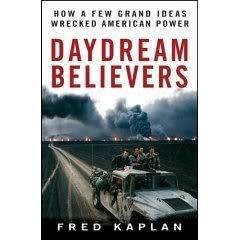The topic below was originally posted on my blog, the Intrepid Liberal Journal as well as The Wild Wild Left, the Independent Bloggers Alliance, The Peace Tree and Worldwide Sawdust.
Most Americans are eager to turn the page on the Bush years. Yet even as we elect a new president we’re still coming to terms with an era that has both tarnished America’s reputation and diminished its influence.
Fred Kaplan chronicles the folly of the Bush years in his new book, Daydream Believers: How a Few Grand Ideas Wrecked American Power (John Wiley & Sons).
Kaplan writes that,
“Nearly all of America’s blunders in war and peace these past few years stem from a single grand misconception: that the world changed after 9/11, when in fact it didn’t.
Certainly, things about the world changed, not least Americans’ sudden awareness that they were vulnerable. But the way the world works – the nature of power, warfare, and politics among nations – remained essentially the same.”
Kaplan also postulates that the Bush Administration as well as most Americans falsely believed we emerged from our Cold War victory stronger. In reality, our geopolitical position was weakened after the Soviet Union’s collapse in 1991 because America’s allies were free to pursue their own interests. In a bipolar Cold War world, America’s allies depended on our protection and remained subservient to our leadership. Once the Cold War ended however, maintaining international coalitions required more compromise and skilled diplomacy because we didn’t enjoy the same leverage.
Tragically, the Bush Administration completely misread our geopolitical position and alienated the world at the very moment we needed friends. Even more remarkable when one considers how much of the world was initially sympathetic to America following 9/11.
Compounding these misconceptions was a Secretary of Defense in Donald Rumsfeld who simply viewed Iraq as a laboratory to demonstrate how easily America could topple a sovereign government’s regime. As Kaplan notes in his book, once Saddam’s government fell, Rumsfeld lost all interest in the required follow through as Iraq went to hell.
Kaplan also provides anecdotes in his book to explain that in George W. Bush’s universe, freedom is humanity’s default state. Hence, all one had to do was use military power to eliminate an obstacle to freedom like Saddam Hussein or hold elections in Palestine and freedom would magically appear. Bush, Cheney and Rumsfeld never considered the hard work of establishing conditions that facilitate a civil society so necessary to freedom as important.
Thomas E. Ricks, the author of Fiasco: The American Military Adventure In Iraq, had the following praise for Kaplan’s book:
“This is the inside history of our time, told with precision and confidence by an author who knows where the secrets are kept – and also that the most powerful and dangerous weapon in Washington, D.C. is a new idea.”
Kaplan who writes the “War Stories” column for Slate was a Pulitzer Prize winning reporter for the Boston Globe while covering the Pentagon and post Soviet Moscow. He’s also the author of the classic book, The Wizards of Armageddon and has written for The Atlantic Monthly, the New York Times, the New Yorker and The Washington Post among other publications.
Kaplan agreed to a podcast interview with me over the telephone about his book and national security policy during the Bush years. Our conversation was just over forty minutes and covered the concept known as a “revolution in military affairs,” the fateful decision to disband the Iraqi army and ban members of the Baath Party from serving in high level positions, the Bush Administration’s bizarre path to a diplomatic accommodation with North Korea, the dysfunctional reign of Donald Rumsfeld as Secretary of Defense, the current dynamic with Rumsfeld’s successor Robert Gates and the path future presidents will need to follow for a sensible foreign policy.
This interview can also be accessed for free via the Itunes Store by searching for “Intrepid Liberal Journal.” Another option is to access an Odeo media player for this interview at my blog.


4 comments
Skip to comment form
welcome Intrepid Liberal Journal… that is quite a handle.
thanks for this essay.
Docudharma!